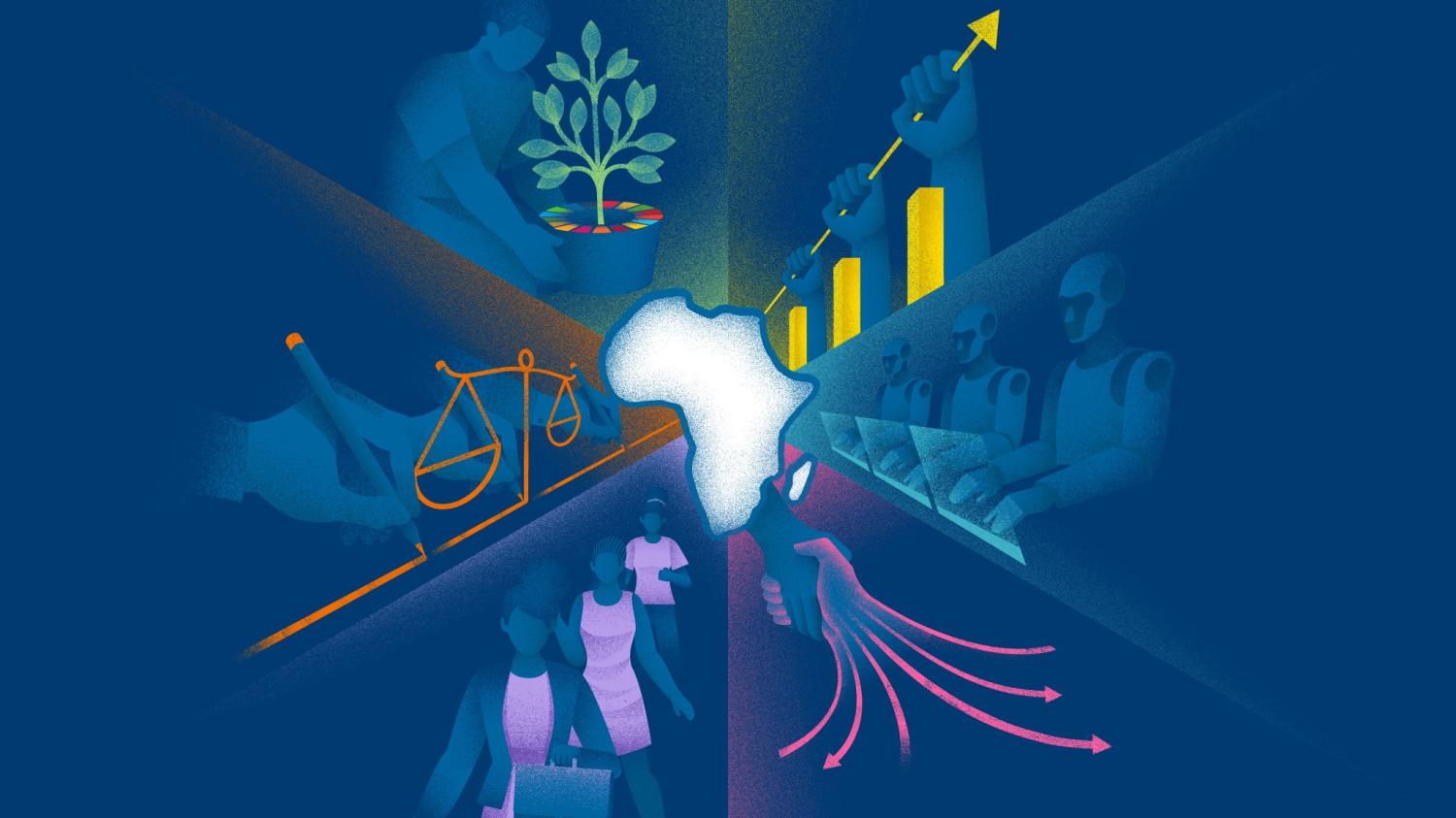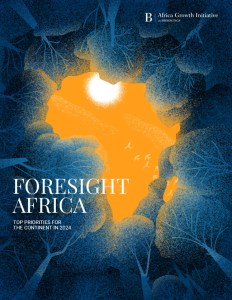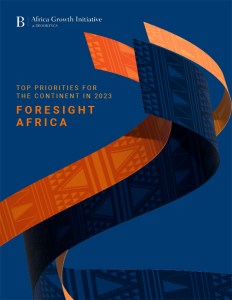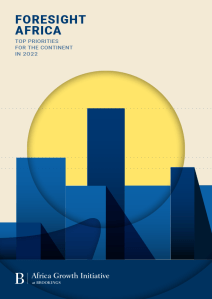2025
2025 will be a critical juncture for Africa’s trajectory. New political leadership in both the African Union and the United States coincides with the urgent need to meet the looming 2030 deadline for the Sustainable Development Goals, to accelerate implementation of the African Continental Free Trade Area, and to modernize and renew the African Growth and Opportunity Act—a cornerstone of the U.S. Africa trade relationship—currently set to expire in September 2025. Paired with an escalating climate crisis and the reverberations of conflict and global economic instability, these dynamics will require bold and coordinated policy action to address Africa’s unique challenges while leveraging its vast potential.
This special edition of Foresight Africa—the flagship annual report of the Africa Growth Initiative at Brookings—extends its focus from one year to five and offers cutting-edge insights and actionable strategies from heads of government, global institutions, continental and multilateral institutions, as well as leading Brookings scholars and other high-profile policymakers, business figures, and civil society leaders.
Together, the report’s six chapters offer a comprehensive vision for Africa’s next chapter—a future driven by African leadership, bold innovation, and inclusive growth.
-
Foreword
 The world is at a crossroads as economic shifts, geopolitical instability, climate disruptions, emerging technologies, political polarization, and societal inequalities reshape the way people, societies, nations, and regions interact in the pursuit of inclusive and sustainable prosperity. In this complex context, Africa plays a role often overlooked in global conversations: The continent is home to some of the world’s fastest-growing economies, the world’s fastest-growing population, some of the biggest reserves of natural resources and critical minerals, accelerated digitalization, and rising partnerships and competitions between traditional and emerging powers.
The world is at a crossroads as economic shifts, geopolitical instability, climate disruptions, emerging technologies, political polarization, and societal inequalities reshape the way people, societies, nations, and regions interact in the pursuit of inclusive and sustainable prosperity. In this complex context, Africa plays a role often overlooked in global conversations: The continent is home to some of the world’s fastest-growing economies, the world’s fastest-growing population, some of the biggest reserves of natural resources and critical minerals, accelerated digitalization, and rising partnerships and competitions between traditional and emerging powers.The Africa Growth Initiative (AGI) at Brookings recognizes the significance of Africa in a complex and interconnected world, and through rigorous research, nuanced analysis, and innovative policy recommendations, fosters dialogue and actionable solutions on the region’s challenges while spotlighting its unique opportunities for the world and advancing U.S.-Africa relations in a competitive geopolitical and geoeconomic environment. Founded in 2008, AGI brings together a network of scholars and African think tanks to provide high-quality, impactful, and nonpartisan policy research on pressing issues. This initiative showcases the very best that Brookings has to offer in terms of open-minded inquiry, diverse perspectives, and scholastic rigor.
At the heart of AGI’s success over the last 15 years has been the initiative’s flagship annual report, Foresight Africa, which uses the occasion of the New Year to draw the world’s focus to critical issues and opportunities shaping the African continent through research and analysis, as well as to engage high-level policymakers. Over the years, the Foresight Africa report has grown to be one of the most-read and most-downloaded Brookings publications, demonstrating the report’s significant reach and impact while highlighting the critical importance of Africa, and the need for reliable, insightful analysis on the region.
With the 2030 deadline for achieving the Sustainable Development Goals (SDGs) fast approaching, this year’s Foresight Africa report is a special edition (2025-2030), and offers an exceptional, visionary, and forward-thinking assessment of the important priorities poised to shape Africa’s trajectory over the next five years.
We approach this year’s Foresight Africa report with a great sense of responsibility, recognizing the continent’s growing role in shaping inclusive global prosperity. By the year 2100, Africa will be home to nearly 40% of the world’s population, up from 18.3% in 2025 and 25% in 2050. This demographic shift makes the continent’s sustainable development a priority not just for Africans, but for the entire global community, since Africa’s sustainable development has direct implications for global stability and prosperity.
Foresight Africa: Top priorities for Africa 2025-2030 explores these opportunities and challenges in depth, offering valuable recommendations and strategies for policymakers and stakeholders to harness Africa’s potential and drive meaningful, positive change. We at Brookings pride ourselves in tackling some of the most challenging issues of our generation head-on, with the intention of being a call to action and guiding light to policymakers, leaders, and global stakeholders who are committed to a better future.
As President of Brookings, it is a privilege to contribute to this flagship publication. Africa’s development is not only a regional priority but a global imperative. The United States has much to gain from a strong, resilient, and thriving Africa, just as Africa benefits from the engagement of global partners. Our interconnected futures demand shared solutions to challenges such as climate change, global health threats, and sustainable economic growth. Writing this foreword is both a reflection of Brookings’ commitment to Africa and my personal belief in the power of knowledge to drive positive change.
This year’s special edition exemplifies the fulfillment of this mission, and it is my sincere hope that you will engage deeply with it and consider how its insights might inform your own work or the work of others committed to Africa’s dynamic future. The stakes are high, and the opportunities are great.
Sincerely,
Cecilia Elena Rouse
President, Brookings Institution -
Letter from the editor
 Foresight Africa 2025-2030: Five years to deliver Africa’s promise
Foresight Africa 2025-2030: Five years to deliver Africa’s promiseWith 2030 on the horizon, now is a critical time to assess the progress, gaps, and road ahead in achieving the Sustainable Development Goals (SDGs), the African Union’s Agenda 2063, and other top policy and development priorities for Africa, U.S.-Africa relations, and the continent’s broader global partnerships.
2025 will serve as a critical juncture for Africa’s trajectory, one shaped by a convergence of factors: new political leadership in both the African Union (AU) and the United States, the urgent imperative to meet the looming 2030 deadline for the SDGs, the need to modernize and renew the African Growth and Opportunity Act (AGOA) set to expire in September 2025, the demand to accelerate the implementation of the African Continental Free Trade Area (AfCFTA), an escalating climate crisis, and the reverberations of conflict and global economic instability. These dynamics require bold and coordinated policy action to address Africa’s unique challenges while leveraging its vast potential.1
This year, Foresight Africa—the flagship annual report of Brookings’ Africa Growth Initiative—is celebrating its 15th anniversary with a special issue, focusing on the next five years (2025-2030) rather than just one. As one of the Brookings Institution’s most-read and downloaded publications, and as one of the world’s most influential publications on Africa, we are dedicated to our role in feeding policy conversations, shaping agenda-setting, and contributing to successful policy implementation—in Washington D.C., across Africa, and around the globe.
This special edition shares cutting-edge insights into the major trends, challenges, opportunities, and actionable strategies for Africa to achieve inclusive and sustainable development priorities, including the SDGs, over the next five years. Contributors include heads of state and government, global institutions, continental and multilateral institutions, and cabinet ministers, as well as leading Brookings scholars and other high-profile policymakers, business figures, and civil society leaders.
Foresight Africa 2025-2030 comes at a pivotal time in history for Africa, the U.S., and the world.2
Africa
Africa has shown incredible resilience amidst global economic challenges, with its GDP expected to grow at an annual rate of 4.2% in 2025—up from 3.1% in 2023.3 The continent is undergoing rapid transformation as its population grows and becomes more urban; meanwhile, its economies are digitalizing and becoming more service-oriented. By 2050, Africa will be home to about 25% of the global population and $16.12 trillion in combined consumer and business spending.4 Africa is also undergoing the Fourth Industrial Revolution, with rapid adoption and effective deployment of technologies that can help solve some of its most complex economic and social challenges.5 Yet this overall positive economic outlook can mask regional and local discrepancies that present unique policy challenges. African debt has soared to its highest point in over a decade, with 20 African countries in or at risk of debt distress.6 Among the top 20 most fragile countries in the world, 14 are now located in Africa (according to the 2024 Fragility Index).7 The time is right to maximize impact to solidify and accelerate a positive trajectory for the continent, including with the implementation of the AfCFTA.
Africa-US relations
The Biden administration made important strides in achieving mutual goals, from increased engagement through the U.S.-Africa Leaders Summit and the first U.S. presidential visit to sub-Saharan Africa since 20158 to tangible actions, including finalizing over 1,695 deals valued at $63.5 billion9 and more than $4 billion in U.S. investment in the Lobito Trans-Africa Corridor.10 As of 2025, the second Donald Trump administration will bring its own approach to engagement with the continent, one that offers both challenges and opportunities. The next four years hold opportunities to turbocharge private sector engagement and, with key strategies, leverage global economic and mineral competition to achieve mutually beneficial goals. Despite the United States’ waning influence on the continent thanks to accelerated engagement by countries such as China, Russia, Brazil, the Gulf States, and more, it still maintains a competitive advantage in areas key to African development and democracy.
How, or to what extent, the Trump administration will go about creating a comprehensive strategy and leveraging these advantages (including reauthorization and modernization of AGOA) has yet to be determined, making this year’s Foresight Africa even more relevant to U.S. policymakers by providing analysis and actionable policy options.
Africa’s global relations
On the global stage, Africa will be at the forefront in 2025 thanks to South Africa’s leadership of the G20 and the African Union’s second year of permanent membership. Additionally, with less than 6% of the SDGs on track in Africa,11 and 17% on track globally,12 these next five years will require concentrated and accelerated action and partnerships to overcome these gaps. Africa’s vast supply of critical minerals, dynamic youth population, rapidly growing economies, and expanding influence in multilateral arenas mean the continent will be central to developing and deploying innovative solutions to global challenges.
It is against this continental, bilateral, and global backdrop that this year’s Foresight Africa seeks to elevate African voices and move beyond policy and development rhetoric toward concrete strategies and actions. As we celebrate 15 years of the publication of Foresight Africa, this year’s edition has the potential to shape the direction of Africa’s future, especially as new leadership in the AU and the U.S. provide a plethora of new policy opportunities and challenges. Given the urgency of bridging the gap between policy intention and policy outcomes, this year’s collection of essays and viewpoints focuses on a diverse range of cutting-edge issue areas, and is packed with creative and actionable policy options that can boost both African and global prosperity, which are inextricably linked.
Overview of Foresight Africa 2025-2030
Achieving this promise requires bold, strategic choices rooted in African agency, innovative policies, and strong global partnerships.13 This year’s report explores six critical themes, shedding light on the opportunities and obstacles that will define Africa’s future and underlie the policies needed to propel its progress over the period between 2025 to 2030 and beyond.
Africa’s economic future depends on its ability to chart its own course. Chapter 1 examines the urgent need for African nations to harness their internal strengths and reduce reliance on external forces to drive sustainable growth from within. The chapter’s contributors challenge conventional development paradigms and highlight how self-determination, regional collaboration, private sector development, and innovation can drive transformative growth. With a keen eye to the future and a combination of perspectives from African leaders at the continental, regional, and national levels, this chapter highlights how Africa’s diversity of strengths—from rising intra-African trade to rich deposits of critical minerals, human capital, and continental financial institutions—can drive its push to meet the SDGs and the Agenda 2063 goals.
Can Africa achieve the SDGs by 2030? With just five years left, Chapter 2 assesses the continent’s progress over the past decade, providing a nuanced analysis of where Africa stands in order to explore viable strategies for accelerating progress. The chapter identifies what has worked, what hasn’t, and what must change to meet the SDG targets on time. This chapter does not shy away from the complexity of the challenges ahead but instead proposes creative pathways for the future to ensure that Africa is on track to achieve development goals. As both a reflection on the past decade and a roadmap for the next five years, its contributors make a call to action for bold, results-driven policies to ensure that no one is left behind in Africa’s development journey.
The key to African prosperity lies with its people—especially its youth and women who have been a driving force for entrepreneurship and innovation over the past decades. Chapter 3 explores how to transform Africa’s demographic advantage into greater economic and social prosperity by investing more in women and youth through education, skills training, and entrepreneurship and by dismantling structural biases and barriers that limit their participation in leadership and decisionmaking roles. This chapter argues that empowering African youth and women is both a moral and economic imperative. Through analyses of the challenges and opportunities that these communities face, this chapter highlights the links between economic, social, and environmental prosperity. A brighter future for Africa means ensuring that its youth and women are at the center of its development story.
Turning policy into action and real-world impact through successful implementation is key to meeting citizens’ aspirations, and it requires effective governance, which has long been recognized as a cornerstone of sustainable development. Chapter 4 dives into the state of governance across Africa, with particular focus on how, and to what extent, African governments are meeting the priorities and needs of African citizens. Drawing on survey data and case studies, the chapter highlights the crucial links between accountability, transparency, and development outcomes, underscoring the importance of citizen engagement in building institutions that deliver for the people they serve. It offers unique perspectives on bridging the gap between policy intention and policy outcome to accelerate the successful implementation of African goals, and dives into key interconnected topics such as the rule of law, employment, fragility, and the connections between debt, development, and democracy, offering a profoundly future-oriented outlook on African governance.
Additionally, artificial intelligence and other emerging technologies are reshaping the world, and Africa is at the forefront, playing a leading global role in their development and deployment now and into the future. Chapter 5 examines how emerging technologies can address some of the continent’s most pressing challenges, including economic, environmental, social, and governance issues. Alongside opportunities, the chapter warns of risks, including the digital divide, and calls for strategic investments in digital infrastructure and skills development. The message is clear: Emerging technologies, when paired with strategic policies, can be a game changer for Africa’s development, making it possible to achieve desired outcomes and improve livelihoods.
Importantly, Africa’s role on the global stage is transforming as the continent increases its voice in key international forums. Chapter 6 explores how African leaders can leverage their growing presence on the global stage, including the African Union’s new membership in the G20, South Africa’s G20 presidency, and relationships with partners such as the United States, China, and multilateral institutions to drive the continent’s priorities. Contributors discuss strategies for achieving the African development agenda related to trade deals, foreign investment, and global collaboration, recognizing the potential challenges ahead. The chapter emphasizes that successful global partnerships must be built on mutual respect, shared benefits, and a commitment to empowering African countries to shape their own economic futures.
Together, these six chapters tackle key pieces of the puzzle and offer a comprehensive vision for Africa’s next chapter—a future driven by African leadership, bold innovation, and inclusive growth. The unparalleled insight offered by this year’s contributors will shape policy discourse across Africa and among its partners, with the potential to transform economies. By embracing its strengths, empowering its people, and forging partnerships that focus on African priorities, the continent can achieve the prosperity it so deeply deserves.
Sincerely,
Landry Signé
Editor, Foresight Africa 2025-2030
Watch the launch event
CHAPTER 1
Africa’s inner strength:
Unlocking a more prosperous future
Africa’s economic future depends on its ability to chart its own course. Chapter 1 examines the urgent need for African nations to harness their internal strengths and reduce reliance on external forces to drive sustainable growth from within. The chapter’s contributors challenge conventional development paradigms and highlight how self-determination, regional collaboration, private sector development, and innovation can drive transformative growth.

Landry Signé, Acha Leke, Mayowa Kuyoro, Omid Kassiri
January 13, 2025
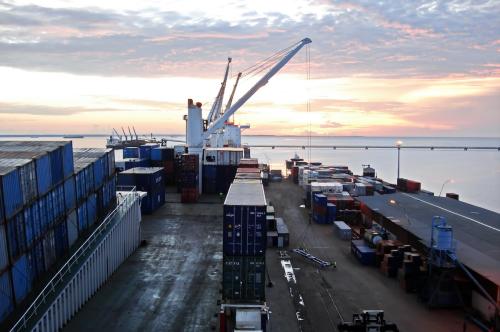
Wamkele Mene
January 29, 2025

Duma Gideon Boko, Bogolo Kenewendo
February 20, 2025
CHAPTER 2
The Sustainable Development Goals:
Accelerating progress
Can Africa achieve the Sustainable Development Goals (SDGs) by 2030? With just five years left, Chapter 2 assesses Africa’s progress over the past decade, providing a nuanced analysis of where the region stands in order to explore viable strategies for accelerating progress. The chapter identifies what has worked, what hasn’t, and what must change to meet the SDG targets on time.
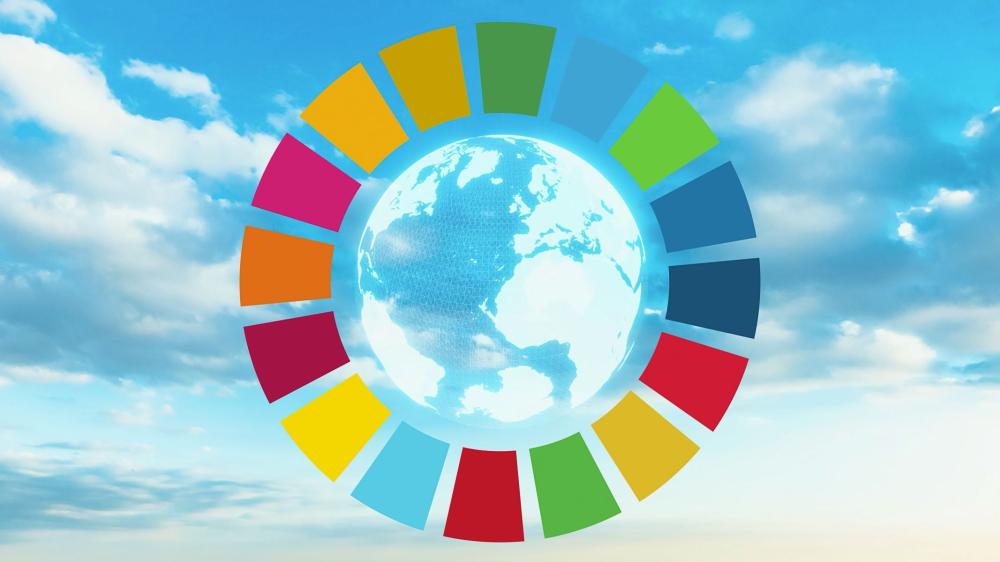
Ahunna Eziakonwa
January 13, 2025
CHAPTER 3
Women and youth:
Harnessing the demographic dividend for a brighter future
The key to African prosperity lies with its people—especially its youth and women who have been a driving force for entrepreneurship and innovation. Chapter 3 explores how to transform Africa’s demographic advantage into greater economic and social prosperity by investing more in women and youth through education, skills training, and entrepreneurship and by dismantling structural biases and barriers that limit their participation in leadership and decisionmaking.

Belinda Archibong
January 13, 2025
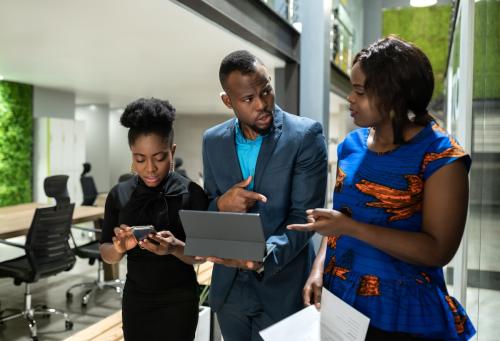
Somachi Chris-Asoluka
February 4, 2025
CHAPTER 4
Effective governance:
Ensuring service delivery for all African citizens
Turning policy into action and real-world impact is key to meeting citizens’ aspirations, and it requires effective governance, which has long been recognized as a cornerstone of sustainable development. Chapter 4 dives into the state of governance across Africa, with particular focus on how, and to what extent, African governments are meeting the priorities and needs of African citizens.

Landry Signé
January 13, 2025
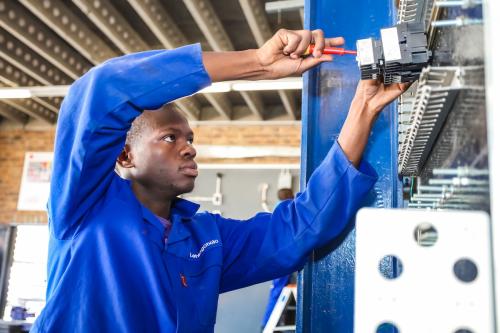
Abdoul Salam Bello
February 6, 2025
CHAPTER 5
AI and emerging technologies:
Solving challenges and seizing opportunities
Artificial intelligence (AI) and other emerging technologies are reshaping the world, and Africa is at the forefront, playing a leading global role in their development and deployment now and into the future. Chapter 5 examines how emerging technologies can address some of the continent’s most pressing challenges, including economic, environmental, social, and governance issues, and be a game changer for Africa’s development.

Landry Signé
January 13, 2025
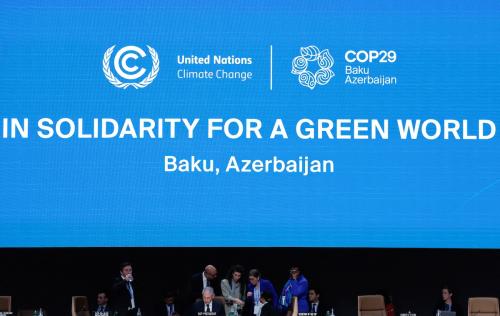
Ede Ijjasz-Vasquez, Jamal Saghir
February 13, 2025
CHAPTER 6
Global partnerships:
Bolstering Africa’s impact on the world stage
Africa’s role on the global stage is transforming as the continent increases its voice in key international forums. Chapter 6 explores how African leaders can leverage their growing presence on the global stage to drive the continent’s priorities. Contributors discuss strategies for achieving the African development agenda related to trade deals, foreign investment, and global collaboration, recognizing the potential challenges ahead.
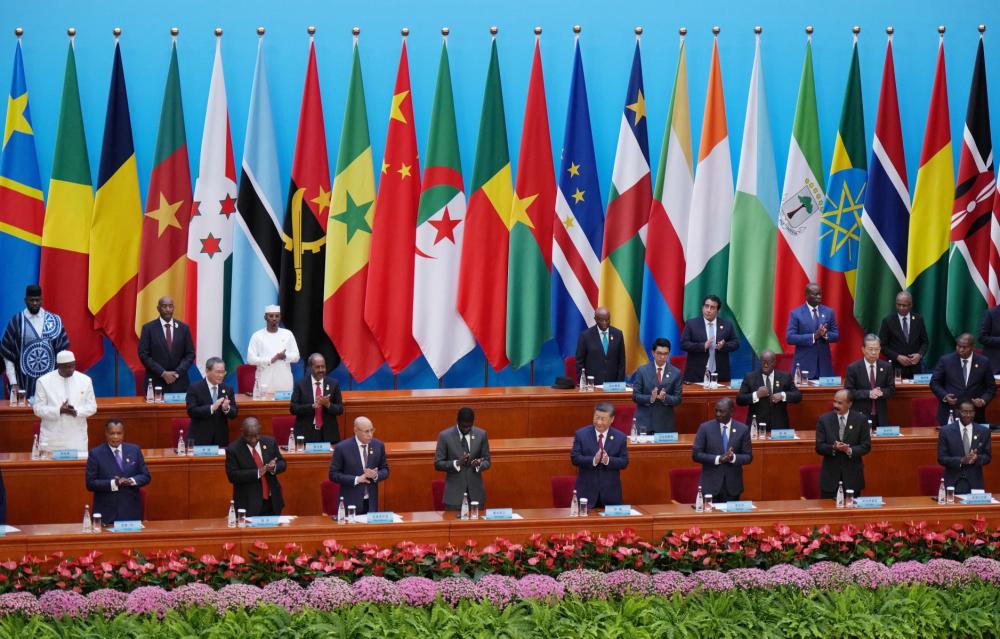
Vera Songwe
January 13, 2025

Witney Schneidman
January 30, 2025

Karim El Aynaoui
February 11, 2025
Listen
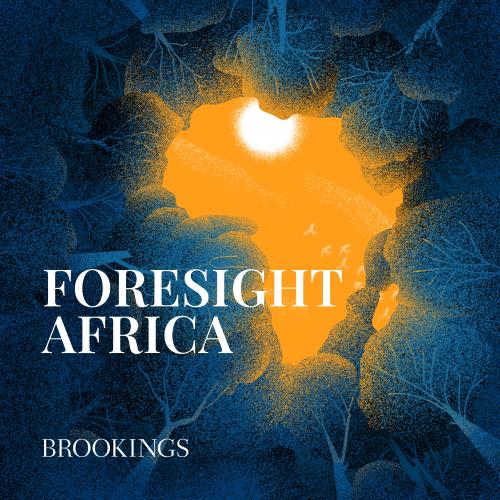
-
Footnotes
- Landry Signé. Realizing Africa’s Potential: A Journey to Prosperity. (Washington, D.C.: Brookings Institution Press, 2025).
- Signé. Realizing Africa’s Potential.
- African Development Bank, “African Economic Outlook 2024,” African Development Bank Group (Abidjan: African Development Bank Group, May 16, 2024), https://www.afdb.org/en/documents/african-economic-outlook-2024.
- Signé. Realizing Africa’s Potential; Landry Signé. Unlocking Africa’s Business Potential: Trends, Opportunities, Risks, and Strategies (Washington, D.C.: Brookings Institution Press, 2020).
- Landry Signé. Africa’s Fourth Industrial Revolution (Cambridge: Cambridge University Press, 2023).
- “African Debt,” ONE Data & Analysis (blog), accessed December 29, 2024, https://data.one.org/topics/african-debt/.
- “Fragile State Index,” 2024, https://public.tableau.com/views/fsi-2024-rankings/ DashboardRankings?:embed=y&:showVizHome=no&:host_url=https%3A%2F%2Fpublic.tableau.com%2F&:embed_ code_version=3&:tabs=no&:toolbar=yes&:animate_transition=yes&:display_static_image=no&:display_ spinner=no&:display_overlay=yes&:display_count=yes&:language=en-US&:loadOrderID=0.
- Shola Lawal, “Biden in Angola: What’s behind the Last-Ditch Africa Trip?,” Al Jazeera, accessed December 19, 2024, https://www.aljazeera.com/news/2024/12/2/biden-in-angola-whats-behind-the-last-ditch-africa-trip.
- Alon Berman, “New Data Shows Significant Growth in U.S.- Africa Trade and Investment Engagement,” Prosper Africa (blog), September 4, 2024, https://www.prosperafrica.gov/news/new-data-shows-significant-growth-in-u-s-africatrade-and-investment-engagement/.
- The White House, “Readout of the Lobito Trans-Africa Corridor Summit,” The White House, December 4, 2024, https://www. whitehouse.gov/briefing-room/statements-releases/2024/12/04/readout-of-the-lobito-trans-africa-corridor-summit/.
- “2024 Africa Sustainable Development Report” (The African Union; African Development Bank; United Nations Development Programme; the United Nations Economic Commission for Africa, July 16, 2024), https://www.undp. org/africa/publications/2024-africa-sustainable-development-report#:~:text=For%20Africa%2C%20less%20than%20 six,picture%20of%20the%20continent%27s%20performance.
- Franck Kuwonu, “2024 SDG Report Highlights Stalled Progress and Growing Inequities as 2030 Deadline Approaches,” Africa Renewal, June 28, 2024, https://www.un.org/africarenewal/magazine/june-2024/2024-sdg-report-highlightsstalled-progress-and-growing-inequities-2030-deadline.
- Signé. Realizing Africa’s Potential.
